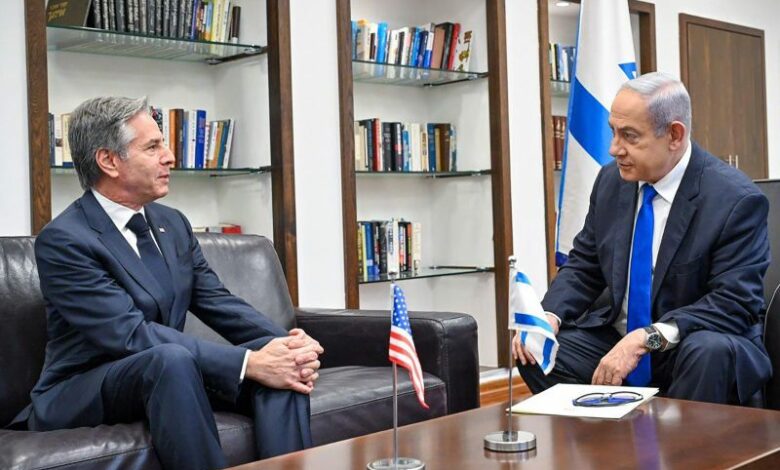
US Secretary of State Antony Blinken met with Israeli Prime Minister Benjamin Netanyahu and other top Israeli officials in Tel Aviv on Tuesday.
The top US diplomat said he had arrived in Israel at “an incredibly challenging time” after making stops in countries around the Middle East.
During his meetings, Blinken reiterated the importance of avoiding further civilian harm and “protecting civilian infrastructure in Gaza” at a time when global health organizations are warning about the enclave’s collapsing health care sector.
Blinken made clear to Israel that Palestinians must be allowed to return to their homes in Gaza “as soon as conditions allow” and must not be displaced from the strip, he said. And in some of his most direct comments on the matter, Blinken said Netanyahu must rein in the far-right tendencies of his government to achieve any progress in the future.
Here’s what else to know:
- On the ground: Al-Aqsa Martyrs Hospital reported receiving dozens of casualties from several parts of central Gaza due to heavy overnight airstrikes. Some of the heaviest combat is in Khan Younis in southern Gaza, where there is fighting on the ground as well as regular airstrikes. The World Health Organization stressed that it “cannot afford” to lose the remaining operational hospitals in southern Gaza. The Hamas-controlled Ministry of Health in Gaza said Tuesday that in the previous 24 hours, a total of 126 people had been killed and 241 injured.
- Hostages latest: Israel’s Foreign Minister Israel Katz told Blinken his nation’s military needs to “finish the war” with Hamas to secure the return of Israeli hostages and achieve the “security of our people.” But Ismail Haniyeh, Hamas’ political leader, reiterated the group’s stance that it will only release Israeli hostages after all Palestinian prisoners are freed from Israel’s prisons.
- Regional diplomacy: King Abdullah II of Jordan will hold a three-way summit on Wednesday with Egypt’s President Abdel Fattah el-Sisi and Palestinian Authority President Mahmoud Abbas to discuss efforts to coordinate a ceasefire in Gaza. Blinken — who met with Netanyahu after meetings with leaders in Saudi Arabia, the United Arab Emirates, Qatar, and Jordan — said Israel must move toward a two-state solution if it wants the help of Arab partners in the region with lasting security.
- Red Sea attacks: The US Navy shot down 21 Houthi missiles and drones launched from Yemen, according to a statement from US Central Command, in one of the largest Houthi attacks to take place in the Red Sea in recent months. The military called it a “complex attack” by the Iran-backed militants.
- Hezbollah tensions: Israel’s military said it killed a regional commander of Hezbollah’s air force, Ali Hussein Burji, on Tuesday. Hezbollah confirmed his death but denied Burji was in charge of its air force or drone program. During meetings with top officials, Blinken said the US and Israel believe “a diplomatic path is the best way to achieve” security on Israel’s northern border. Tensions have ramped up after Israel killed a senior commander in southern Lebanon on Monday. Last week, a senior Hamas official was killed in Beirut in a strike that Israel has not claimed.
- Genocide allegations: Israel is set to appear before the International Court of Justice this week in a high stakes case that could determine the course of the brutal war in Gaza. South Africa brought the case against Israel, accusing it of being in breach of its obligations under the UN’s Genocide Convention in its war on Hamas. Israel has rejected the accusation.




